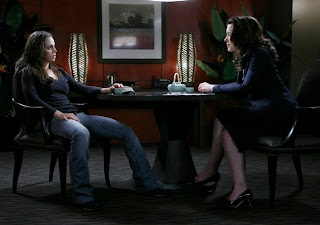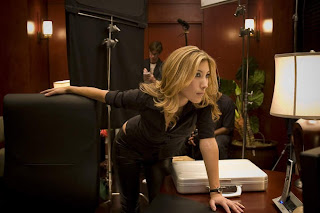Looking back on it, this certainly seems like it’s been the
summer of consent issues. From Robin Thicke’s horrifying “Blurred Lines” to a
bunch of really horrifying rape case verdicts, including one that tried to
invalidate the concept of statutory rape – let’s just say it’s not been fun.
So, in light of all of this, I think today might be a good
day to look at a show that could be retitled Consent Issues, the Musical. Well, it could if it were a musical.
Which I am genuinely surprised they never shoehorned in. It’s totally the kind
of thing this show could get away with.
Anyway, as promised on Monday, we’re talking about Dollhouse, the short-lived Joss Whedon
sci-fi head-scratcher that asked a lot of important questions about consent,
personhood, and Eliza Dushku’s acting ability. Unfortunately, the only one we
really got a conclusive answer on was that last one.
For those of you utterly baffled so far, Dollhouse (all two seasons of it) is a
show about pseudo-science. You sort of have to accept that going in. It’s about
a sort of high-tech brothel hiding under the streets of LA. In this Dollhouse,
people don’t just get assignments, they become
their assignments. These people, who we are assured are sort of volunteers
(kind of, not really), have had their entire identity erased, and exist in a
state of blank, infantile wonder, until they get a client, at which time they
will have a whole new personality and person uploaded into their brains. They
will perform the engagement, come back, and be wiped again. Over and over and
over.
It’s weird.
But it’s also really interesting. The story follows a whole
host of characters and their various ethical problems (or lack thereof) with
the Dollhouse. Everyone from Adelle (Olivia Williams), the woman who runs the
Dollhouse, to Topher (Fran Kranz), the tech who imprints the dolls with their
personalities, to Paul Ballard (Tahmoh Peniket), the FBI Agent tracking them
down, to Echo (Eliza Dushku), a doll slowly gaining awareness of her world.
The show is really good, except for the first five episodes
or so, which are varying degrees of cringeworthy. You can practically smell the
network interference on them, with hackneyed, obvious clients, stupid
conflicts, and way too much freaking exposition. But if you can hold on through
episode six, then you’re in for a pretty cool ride.
For the record, part of the reason the show has a little
trouble finding its footing is that it wants so desperately for Eliza Dushku’s
character, Echo, to be the focus. But she isn’t. I mean, she’s interesting, I
guess, but there’s something a little bland about watching a girl who isn’t
really a person become different people each week. Don’t get me wrong, there’s
some drama there, as Echo slowly starts to become aware, and realize what’s
happening, and there’s a mystery about why she’s there in the first place, and
who she was before, and all that stuff. But sadly, Dushku just isn’t a strong
enough actress to anchor the show, and there are a bunch of more compelling
stories in the show.
For example. Dichen Lachman plays Priya Tsetang/Sierra.
Priya is the original personality, and Sierra is her call sign after she’s been
wiped. Priya didn’t actually sign up for the Dollhouse, and while other
people’s stories could be called coercive and a little abusive, Priya’s is down
right horrifying.
Her crime, her great sin that had to be erased, was that she
turned down a wealthy businessman with ties to the Rossum Corporation that runs
the Dollhouse. He decided that if he couldn’t have her, then he’d just erase
her whole life so that he could. Because no one says no to him. So he had her
kidnapped by men with guns, taken to the Dollhouse, and force erased. Then he
bought her time and programmed her with a personality so that she’d beg for it.
If you aren’t slightly nauseous right now, reread that
paragraph above until it sinks in.
We know all of this because Sierra, the doll who is supposed
to have no memory of her past life, still feels the effects of this trauma. She
cries at night. Sometimes she screams. Oh, and she is later sexually abused by
her handler too.
Sierra gets the chance to finally confront her rapist, in an
exercise the Dollhouse creates to give her closure, and honestly, it’s even
more horrifying for that moment of clarity. Because after that closure, she is
wiped again, and we know that she’ll be sent on more engagements with that
client. The rape isn’t over. It will continue on and on and on.
This is probably the most extreme of the cases, but it
highlights the real problems the Dollhouse shows us. Even if the Dolls do
originally consent before being wiped, they cannot consent in their Doll state,
and once imprinted, they have had the ability not to consent removed. It’s just
one giant (literal) mind rape.
But far from just being a really problematic show, this is
actually the point of Dollhouse.
There is no such thing as carry-over consent. And even when the engagement is
actually really sweet and lovely, it’s still mind rape, because the Dolls
cannot consent. And they most definitely cannot give informed consent.
Later in the show this gets even more complicated, when
Echo’s kidnapped by the Doll-gone-bad Alpha. Alpha had a “composite event”,
which means that he remembered every personality he’d ever been imprinted with
and combined them into one pissed off group of people. He’s obsessed with Echo,
and wants her to do the same. So he creates a composite event, shoves her into
it, and waits.
Funny things, though, when Echo comes out, now remembering
everything, she doesn’t want to thank Alpha. Actually, she hits him in the head
with a metal pipe.
Why? Because he made that choice for her. He didn’t ask. I
mean, technically he couldn’t ask, which just shows how incredibly problematic
this whole thing is, but still. He didn’t ask if she wanted to remember, he
just did it to her.
So too, Paul Ballard, the heroic FBI Agent, doesn’t ever ask
if Echo wants to be saved. He just barges in and tries to kidnap her. You know,
because it’s the right thing to do. But he never stopped to consider whether
she wanted to be taken. And frankly, I find it incredibly awesome that a
network show decided to ask that question.
I could go on and on with the various different takes on
consent and personhood and individual responsibility that litter this show, but
there just isn’t enough space in this article, and besides, I need something to
talk about on Friday. So we’ll sort of close out with some philosophy.
Did you shudder? I felt that shudder. Shut up, philosophy is
awesome.
Dollhouse isn’t
about one woman and her fight against the system, her fight to be herself. As
much as it tries to be, this isn’t a show about Echo or Caroline or Eliza
Dushku. I would argue, that this show is about all the sides to the argument
and how completely screwed up all of them are.
You have Adelle running what basically amounts to a
whorehouse, sending out people who can’t consent to have sex or violence or
something with people they can’t consent to. She does it for profit and
science. You have Topher, who imprints personalities, because that’s his job
and he gets to be on the cutting edge of science. And also to play God.
You have Boyd (Harry Lennix), who protects Echo on her
engagements, but never steps in to stop the incredibly sketchy sex happening.
He has problems with the system, but he deals with it by keeping his mouth shut
and keeping Echo alive.
You have Dr. Saunders (Amy Acker), who hates the Dollhouse
and everything they do, but doesn’t say anything, doesn’t speak against it,
just stays and puts the Dolls back together when they’re broken.
You have Paul Ballard, whose reaction to the Dollhouse is
that it’s unmitigatingly evil and must be stopped, but who goes about his
investigation in a way that shows no real understanding of the issues at stake.
You have Sierra, Echo, Victor, Whiskey – all those Dolls who
can’t consent, who live like children and then get sent out as different
people.
You have the clients, who know they’re renting a person. Who
know that this person isn’t real exactly, and who know that what they’re doing
is sketchy at best, rape at worst.
And you have Caroline, who may rail against the Rossum
Corporation, but in the end chose this. She chose to be a Doll, to have her
memory erased, and to let herself fall into a state where she could no longer
consent.
Who is to blame?
I think the real message of Dollhouse is that the question of blame is both incredibly
important, and ridiculously difficult. But that doesn’t excuse us from answering
it.
 |
| That's right, Echo. Rage against the machine. |







As much as it tries to be, this isn’t a show about Echo or Caroline or Eliza Dushku. I would argue, that this show is about all the sides to the argument and how completely screwed up all of them are.
ReplyDeleteI've finally been talked into seeing this. I like it, more than I thought I would, but there's something unsatisfying about it. It.... kinda comes across as a thought experiment in what it would take to make bodily rights, slavery, and sexual consent into actually complicated questions. Which is neat, in an abstract kind of way, but feels a little empty when the real-world versions of those issues aren't complicated (not in a moral sense, I mean) - just beset by people defending the indefensible by trying to make them so - which may be the way the Dollhouse was intended to be seen, but for me it doesn't quite hit that target.
Hmm. I feel like the show, more than most of Whedon's work, took a long time to really gel, but when it did, it had some really interesting questions on self and personhood.
DeleteBut yes, it is hard to make an argument in favor of slavery, and it's even harder to think of why one ought to do that.
Oh, yeah, the show certainly shines on the subject of identity.
DeleteA good musician needs to master many skills and therefore, to know how to practice "perfectly" becomes a very complex and difficult question.headphones for dj
ReplyDeletePackers And Movers Ghaziabad To Delhi
ReplyDeletePackers And Movers Ghaziabad To Lucknow
Packers And Movers Ghaziabad To Hyderabad
Packers And Movers Noida To Bangalore
Packers And Movers Noida To Gurgaon
Packers And Movers Noida To Pune
Packers And Movers Noida To Hyderabad
Packers And Movers Delhi To Bangalore
Packers And Movers Delhi To Chennai
Packers And Movers Delhi To Pune
As the technology grew, music got more technical, complex and in demand. Others take credit for using music they don't own. Nowadays, independent musicians are well aware of protecting their work for legal purposes. https://spotistar.com/soundcloud-followers/
ReplyDeleteCelebration season has arrived, and if the scents of sizzling flame broils in your own lawn aren't doing your mid year equity, perhaps it's a great opportunity to grow your territory and offer it with a horde of music-fixated, and sweat-soaked, moving individuals. happy instrumental music
ReplyDelete